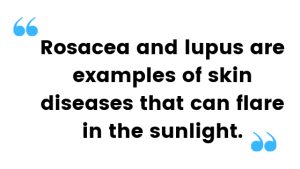
Sun protection can save your life (and your beauty!). We have known this for many years, yet so many patients still come into my exam room with chronic and severe effects from the sun. I easily have patients of all ages with glaring evidence that they are under protecting themselves while overdosing on UV radiation. So why is this?
First, I find that patients don’t fully understand the importance of sun protection. Why should we go through the trouble to incorporate this into our daily lives and our vacations? And second, patients misunderstand how to effectively protect their skin with the options available.
There has been a significant amount of quality research which demonstrates the harmful effects of UV radiation on humans. True to my mission of sharing evidence-based advice, I delved into this evidence to bring you the facts and explain why you should care about sun protection.
In this post, I am going to tell you the 5 most compelling reasons why you should care about sun protection. You will learn why improving your habits can save your life and your youthful looks!

#1: Sunlight causes SKIN CANCER
The sun is a known human carcinogen. That’s as cut and dry as it can get, my friends! Our skin absorbs this carcinogen, which increases our risk of developing skin cancer. Skin cancer can be disfiguring and, in some cases, deadly. As a dermatologist with a sub-specialization in skin cancer surgery and reconstruction, diagnosing and treating skin cancers of all types and severities is the bread and butter of my practice. It is a humbling experience to care for skin cancer patients and serves as my daily reminder to continue my mission of public education on this topic! Our behavior starting at a very young age determines our risk of skin cancer later in life. It is pertinent we are starting NOW with good habits, especially in our children.
#2: Sunlight causes PREMATURE AGING
Sunlight wreaks havoc on our youthful appearance and makes people look OLDER than their natural age. Sunlight breaks down collagen and elastic fibers in the skin, creates uneven spots of discoloration known as lentigines or “sunspots,” and promotes wrinkling of the skin. Collagen is what gives our skin the taut, full and youthful appearance. With less collagen, our skin is thin and saggy. Overexposure to the sun causes the paper-thin and wrinkled look of aging skin. This starts as a slight increase in fine lines and subtle wrinkles and progresses to deep and permanent wrinkles over time.
#3: Sunlight causes CHANGES IN THE IMMUNE SYSTEM
Sunlight causes increased inflammation in the skin. This occurs because sunlight stimulates immune cells to release pro-inflammatory markers that can lead to toxic and allergic skin conditions and flare autoimmune diseases such as lupus. Concurrently via a different cellular pathway, sunlight causes an immune system suppression. This pathway is responsible for allowing the growth of skin cancer tumors and causing recurrent flares of herpes simplex or “cold sores.”

#4: Sunlight causes RASHES
Sunlight can directly cause several types of classic rashes. Polymorphous light eruption is one of the most common rashes caused by the sun. Sunlight can also aggravate pre-existing skin diseases. This means that the sun did not cause the disease, but it can worsen the severity and symptoms of the disease. Rosacea and lupus are just two examples of skin diseases that can flare in the sunlight.
#5: Sunlight causes SUNBURN
This is intense redness of the skin following sun exposure, which can lead to blisters and peeling of the skin. Sunburns can be exquisitely painful and, in some cases, require medical attention. It is essential to understand that a sunburn is NOT just a temporary problem! Sunburns cause negative implications later in life. Studies have shown that a single blistering sunburn in childhood or adolescence nearly doubles the risk of developing melanoma. Further, certain medications (such as common oral acne medications) put you at high risk for experiencing severe sunburns after only a short time in the sun. Sunburns are never the best way to start or end a vacation, so plan for how you will protect yourself and your family!

We are now clear that UV radiation causes:
- Skin cancer
- Premature aging
- Changes in the immune system
- Rashes
- Sunburn with lasting effects
Now let’s talk about how to EFFECTIVELY protect ourselves while outdoors. In this next post, I will teach you how to protect your skin in the sun and clear up many misconceptions about this process.
I hope this information provides compelling evidence for you to improve your sun-safe habits!



